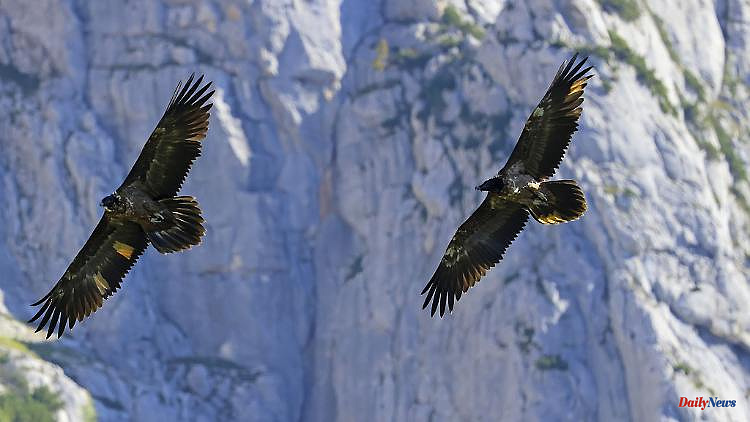Almost a year ago, young bearded vultures were released into the wild in Germany for the first time since they were exterminated. The two bird ladies are now getting reinforcements - from close relatives in Spain.
Berchtesgaden (dpa/lby) - Wally and Bavaria will soon no longer be the only Bavarian bearded vultures: On June 9th, two young birds are to be released into the wild again in the Berchtesgaden National Park. "Funnily enough, these are Wally's sister and Bavaria's cousin. They come from the same breeding center as the two from Spain," said Toni Wegscheider from the State Association for Bird Protection (LBV) on Tuesday.
The young birds will live in the same niche as their older relatives did last year. They have long since moved out there and are always on long reconnaissance flights in the Alps. Several media had previously reported on the new release.
The young Bearded Vultures are named after their breeding numbers BG1145 and BG1147. BG1145 hatched on March 6th, BG1147 three days later. But they should also get "real" names, like their extremely popular predecessors. Numerous people had followed their release intensively for weeks via live webcam. It was the first time in more than 140 years that specimens of these imposing animals, which had been exterminated by humans, made their rounds in Germany.
At times it looked as if the new bearded vultures for the Berchtesgaden National Park could even come from nearby, from Franconia: a pair of bearded vultures had started to breed in the Nuremberg zoo. But now it became known that the chicks had died before hatching from the eggs.
Wally and Bavaria will have offspring in two years at the earliest, more likely in five years. Quarrels between the two elders and the young are not to be expected. "Bearded vultures only become rough when they settle down in an area," said LBV expert Toni Wegscheider recently. With a wingspan of up to 2.90 meters, bearded vultures are the largest breeding birds in the Alps, but they are completely harmless to humans and animals: They only eat carrion - and from this almost only the bones.
However, there is some uncertainty at Wally at the moment. It has been unclear where she is since mid-April, and her transmitter no longer transmits location data. "We assume that the bird is fine because the transmitters are unfortunately very unstable," said Wegscheider. In the past month alone, four transmitters from other animals had fallen off in the Alpine region. In order to have final certainty that Wally did not die, the experts will again abseil down a steep slope on the Zugspitze in the next few days to look for the GPS device there.
Bavaria, on the other hand, is currently back home: "She's in our area, within sight of the Watzmann in Tyrol," reported Wegscheider. With her enormously sharp eyes, Bavaria should quickly get the hang of it when the relatives from Andalusia have arrived.












